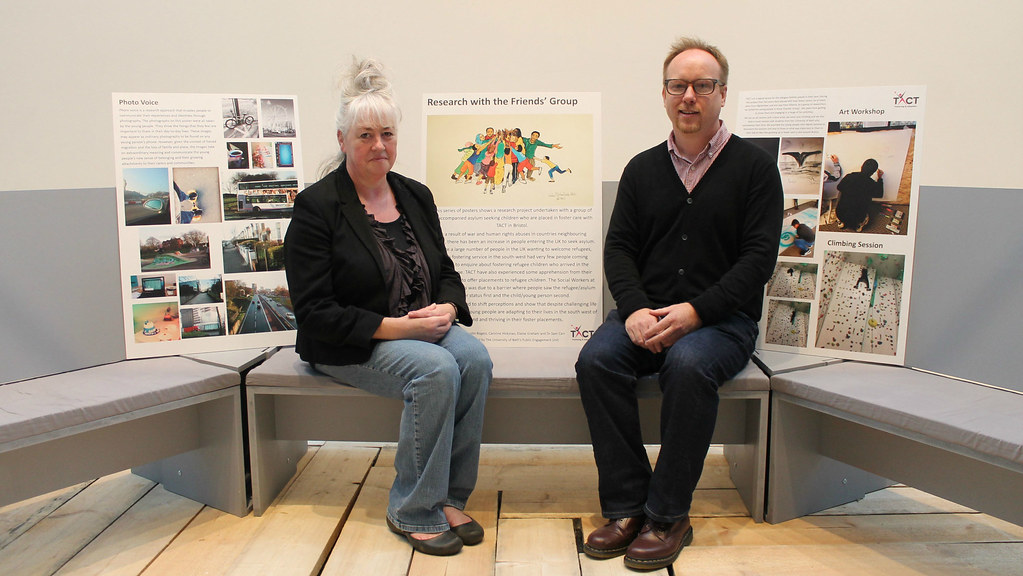An innovative research project designed to shift public perceptions about fostering unaccompanied child refugees has been shortlisted for a prestigious national award for public engagement.
Recognised by the National Co-ordinating Centre for Public Engagement (NCCPE) through its 2016 Engage Competition, the project - ‘Fostering Hope’ – is bringing together researchers from the University in partnership with Bristol-based fostering charity TACT (The Adolescent and Children’s Trust) to tackle a recruitment challenge in finding new foster carers for refugee children.
With seed funding from the University's Public Engagement Unit, the team involved worked with a group of fostered refugee children, sharing their experiences through a photo-voice project designed to challenge some of the many of the misconceptions that exist and act as barriers to fostering. These included issues about meeting the cultural needs of children as well as misperceptions about what being an asylum seeker means.
The participatory project involved running focus groups with foster carers organised through TACT, and workshops for the young people, giving them a voice to drive the research. By providing cameras, the researchers challenged young people to document their day-to-day lives and activities, depoliticising ideas that persist and showing fostered refugees first and foremost as children.
'Overwhelmingly positive'
Photos and posters from the project were put on public display, including to over 2000 people at Refugee Week in Bristol and also at The Edge at which responses, including from foster carers, were overwhelmingly positive.
Elaine Graham, Area Manager at TACT explains: “As a fostering service we are experiencing significant challenges in finding homes for young unaccompanied asylum seekers. This project was innovative in how it brought together research expertise from Bath to help us bring about change. Early results have been very good and this kind of work shows the importance of this kind of collaboration.”
Lead researcher behind the initiative, Dr Justin Rogers from the Department of Social & Policy Sciences, added: “One of the most significant aspects about this work was that it enabled our group of young refugees to be the ones to lead the initiative to change perceptions. Through the activities we organised and the photo-voice project that this involved, not only did they enjoy and benefit from the work but it had added impact among other audiences too.”
Inspiring and involving public audiences
Being shortlisted for the NCCPE award is a remarkable achievement – finalists have been selected from over 180 entries which demonstrate a broad range of high quality activities to inspire and involve public audiences.
Across the board, finalists’ work ranges from digitally reconstructing city histories to protecting endangered species; working with older people as researchers to delivering hyper-local science festivals; or enabling young children to conduct their own research, right through to influencing the United Nations.
Co-investigator, Caroline Hickman, said: “To be recognised by the NCCPE in this way is a real honour and recognition of the successful collaboration between University research and a local fostering agency facing a particular challenge. 'Fostering Hope' shows how, through a focus on public engagement from the outset, academic research can really help to drive important societal changes.”
Paul Manners, Director of the NCCPE said: “The Engage Competition is a highlight of our work at the National Co-ordinating Centre for Public Engagement. It uncovers amazing people, projects, partners and research. This year did not disappoint. The quality of the applications has been higher than ever, showcasing the very best of engagement practice across all disciplines and participant groups - reaching from the very local to the global.”
There are six competition categories, and the winner of each category will receive a prize of £1,500 to go towards further public engagement work.
The winners will be decided on the 28 November, before being announced at an awards ceremony as part of Engage 2016, the NCCPE’s Annual Conference, on 29 November 2016.
'Fostering Hope' is the first ever University of Bath project to have been shortlisted for the award. It also involves involves Dr Sam Carr from the Department of Education.
For other researchers wishing to find out more about how the public engagement unit could help shape their research to reach new audiences, please contact Ed Stevens via E.Stevens@bath.ac.uk

